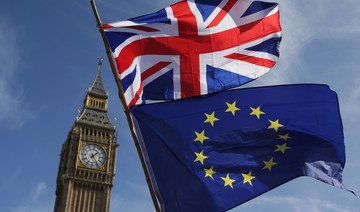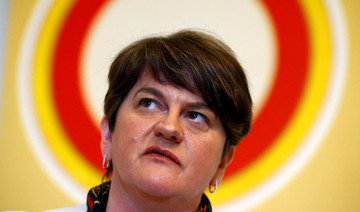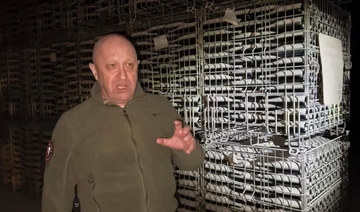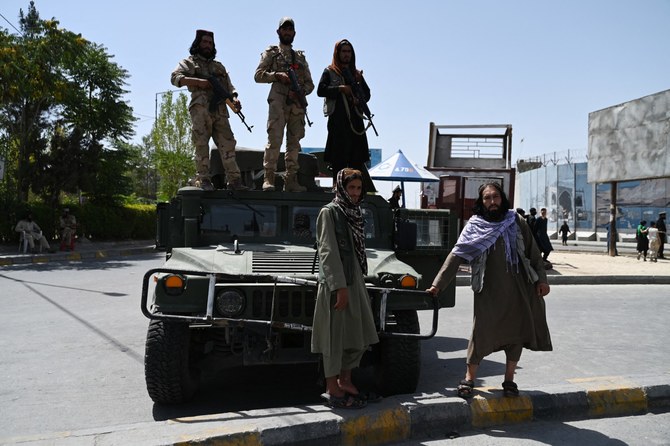LONDON: British and European officials are discussing the possibility of extending the formal exit process from the European Union amid fears a Brexit deal will not be approved by March 29, The Daily Telegraph reported, citing unidentified sources.
The Telegraph cited three unidentified EU sources as saying British officials had been “putting out feelers” and “testing the waters” on an extension of Article 50, a part of the Lisbon Treaty which sets out the conditions for leaving the EU.
Prime Minister Theresa May has repeatedly ruled out delaying Brexit, though she has also warned lawmakers that if they reject her deal then Brexit could be derailed or that the United Kingdom could leave without a deal.
“We are leaving the European Union on the 29th of March,” British Brexit Secretary Stephen Barclay said when asked about the Telegraph report. “We are not looking to extend.”
When asked directly if he denied the report, Barclay said: “Yes, because I can be very clear that the government’s policy is to leave on March 29.”
He added that extending the Article 50 exit process was not a unilateral decision for the United Kingdom. Extending would require the unanimous agreement of EU heads of state in the European Council.
EU leaders and officials have said over recent weeks that they would be open to extending the Brexit process if Britain asked – though have made clear that, so far, May has stuck to her position that she will seek no delay.
EU officials have been working through the legalities and issues involved in all scenarios, said one senior official close to the Brexit talks, while stressing that there was no indication from leaders that an extension was a preferred option.
Some officials have insisted that any delay could only be of a few weeks and only if there were a clear indication that a deal was about to be concluded.
The future of Brexit remains deeply uncertain as British lawmakers are expected next week to vote down the divorce deal that May struck with the EU in November.
Business chiefs and investors fear leaving the EU without an approved deal would silt up the arteries of trade, spook financial markets and dislocate supply chains for the world’s fifth-largest economy.
Besides leaving without a deal or on the terms of May’s deal, other options include delaying Brexit, calling a parliamentary election or holding another referendum on EU membership.
The ultimate Brexit outcome will shape Britain’s $2.8 trillion economy, have far-reaching consequences for the unity of the United Kingdom and determine whether London can keep its place as one of the top two global financial centers.
May last month pulled a parliamentary vote on her deal, struck after two years of negotiations and designed to maintain close future ties with the bloc, after admitting it would be heavily defeated.
A new parliamentary vote is due on Jan. 15, though it is unclear what May’s next steps would be if the deal is defeated.
Goldman Sachs said its base case was that May’s deal would be defeated at first but a close variant of the deal would eventually be approved by parliament.
May is seeking assurances from the EU on the most controversial part of her deal — an insurance policy to prevent a hard border between EU-member Ireland and the British province of Northern Ireland.
Irish Prime Minister Leo Varadkar has said the EU is willing to give Britain reassurances about the Irish backstop before British lawmakers vote on May’s Brexit deal next week.
“We don’t want to trap the UK into anything – we want to get on to the talks about the future relationship right away,” Varadkar said, the Irish Times reported. “I think it’s those kinds of assurances we are happy to give.”
However, Britain’s former Brexit Secretary David Davis, who opposes May’s deal, said assurances such as proposed by Varadkar would not be enough to convince rebels to support the deal.
UK, European officials discussing possible Brexit delay: report
UK, European officials discussing possible Brexit delay: report
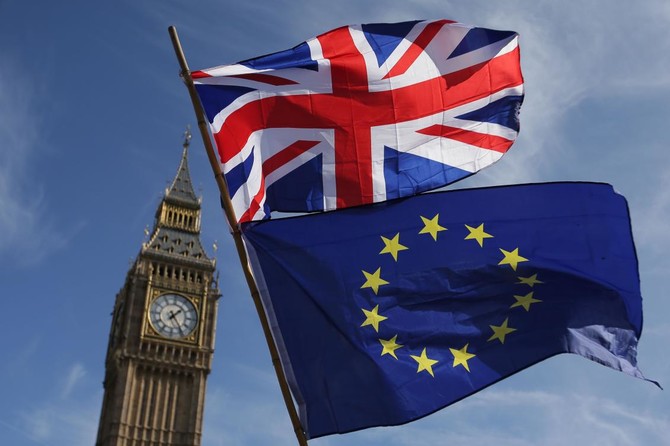
- Prime Minister Theresa May has repeatedly ruled out delaying Brexit
- The Telegraph cited three unidentified EU sources as saying British officials had been ‘putting out feelers’ and ‘testing the waters’ on an extension of Article 50
UK says to expel Russian defense attache as ‘undeclared military intelligence officer’
- Interior minister James Cleverly told parliament the UK would also remove the diplomatic status of several Russian-owned properties
- UK is currently a staunch NATO backer of Ukraine
Interior minister James Cleverly told parliament the UK would also remove the diplomatic status of several Russian-owned properties, including one in Sussex, southern England, and another in London “which we believe have been used for intelligence purposes.”
There would also be new restrictions on Russian diplomatic visas such as a cap on the length of time Russian diplomats can spend in the UK, he added.
The move comes with the UK concerned at an apparent increase in “malign” Russian activity on UK soil, including an arson attack on a Ukrainian-linked business allegedly orchestrated by the Kremlin.
A British man who it is claimed has links to the Wagner Group was charged in connection with that case last month.
London has previously accused Moscow of being behind the poisoning of two Russian former agents on UK soil, and of a spate of cyberattacks and disinformation campaigns.
The UK is currently a staunch NATO backer of Ukraine, providing training for troops and military equipment in the fightback against Russia.
Cleverly said the new package of measures was intended “to make clear to Russia that we will not tolerate such apparent escalations.”
He warned that Moscow would make accusations of Russophobia and spread conspiracy theories in response to his announcement.
“This is not new and the British people and the British Government will not fall for it, and will not be taken for fools by (President Vladimir) Putin’s bots, trolls and lackeys.
“Russia’s explanation was totally inadequate. Our response will be resolute and firm.
“Our message to Russia is clear: stop this illegal war, withdraw your troops from Ukraine, cease this malign activity.”
Four arrested for duping young Indian men into fighting for Russia in Ukraine
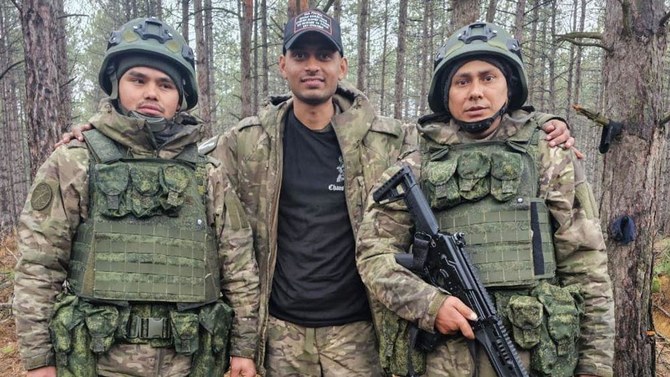
- Families of two Indian men who were killed in the war said that they had gone to Russia expecting to work as ‘helpers’ in the army
- At least 200 Nepalis are estimated to be serving in the Russian army and about 100 are missing
NEW DELHI: Indian police said four people linked to a network of human traffickers have been arrested on suspicion of luring young men to Russia with the promise of lucrative jobs or university places only to force them to fight in the war in Ukraine.
About 35 Indian men were duped in this manner, the Central Bureau of Investigation (CBI) said in March.
The four Indian nationals arrested were a translator, a person facilitating visa processing and the booking of airline tickets as well as two “main recruiters” for the southern states of Kerala and Tamil Nadu, the CBI said late on Tuesday.
The investigation “is continuing against other accused persons who are part of this international network of human traffickers,” the CBI said.
The families of two Indian men who were killed in the war have told Reuters they had gone to Russia expecting to work as “helpers” in the army.
India’s foreign ministry says each case has been “strongly taken up” with Russia. Moscow has not responded to repeated requests from Reuters for comment.
Other South Asian countries have also warned their citizens against such trafficking networks after multiple cases emerged of people being similarly duped into fighting in the Russian army.
Sri Lanka said on Wednesday that “a number” of its retired war veterans were lured to the Russia-Ukraine war front with the promise of a “handsome salary,” citizenship, and other benefits for serving in the army, none of which were granted.
“A significant number of war veterans have died and sustained injuries on the battlefield,” Sri Lanka’s Defense Ministry said, adding that the law would be “strictly enforced” in the matter.
A retired major and an employment agent have been arrested in this connection.
Nepal, which paused issuing work permits for Russia and Ukraine in January, has said several young unemployed Nepalis had been illegally recruited into the Russian army by agents who charged them hefty sums for visas.
At least 200 Nepalis are estimated to be serving in the Russian army and about 100 are missing, officials have said.
India has refused to condemn Russia over the war, calling instead for dialogue and diplomacy to end the conflict. The two countries have enjoyed a close relationship for decades, trading in items from fighter jets to tea.
India has also increased its purchase of cheap Russian oil since the war, with Moscow emerging as its top oil supplier in the last financial year for the second year in a row.
Police clearing Pro-Palestinian tent encampment at George Washington University, dozens arrested
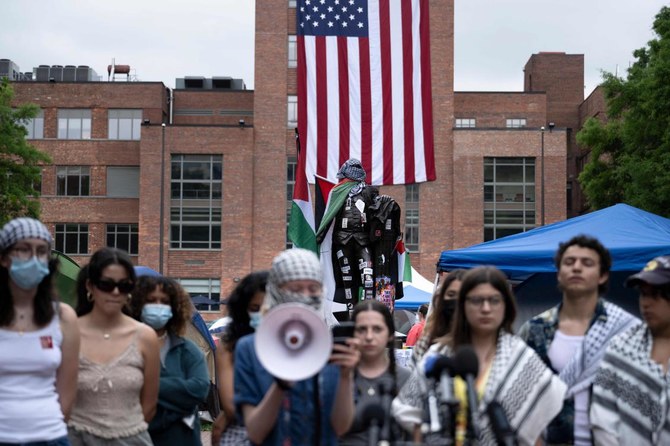
- A pro-Palestinian tent encampment was cleared at the University of Chicago on Tuesdday
- Tensions have continued to ratchet up in standoffs with protesters on campuses across the US
WASHINGTON: Police began to clear a Pro-Palestinian tent encampment at George Washington University early Wednesday and arrested dozens of protesters, hours after dozens left the site and marched to President Ellen Granberg’s home.
Officials at the university in Washington, D.C., had warned of possible suspensions for students engaging in protest activities on University Yard.
“While the university is committed to protecting students’ rights to free expression, the encampment had evolved into an unlawful activity, with participants in direct violation of multiple university policies and city regulations,” the university said in a statement.
Local media had reported that some protesters were pepper sprayed as police stopped them from entering the encampment and nearly 30 people had been arrested, according to community organizers.
In a statement, the District of Columbia’s Metropolitan Police Department said arrests were made for assault on a police officer and unlawful entry, but a number of arrests wasn’t immediately given. The department said it moved to disperse demonstrators because “there has been a gradual escalation in the volatility of the protest.”
Tuesday evening, protesters carrying signs that read, “Free Palestine” and “Hands off Rafah,” marched to Granberg’s home. Police were called to maintain the crowd. No arrests were made.
This comes as Mayor Muriel Bowser and MPD Chief Pamela Smith are set to testify about the District of Columbia’s handling of the protest at a House Committee on Oversight and Accountability hearing on Wednesday afternoon.
A pro-Palestinian tent encampment was cleared at the University of Chicago on Tuesday after administrators who had initially adopted a permissive approach said the protest had crossed a line and caused growing concerns about safety.
University President Paul Alivizatos acknowledged the school’s role as a protector of freedom of speech after officers in riot gear blocked access to the school’s Quad but also took an enough-is-enough stance.
“The university remains a place where dissenting voices have many avenues to express themselves, but we cannot enable an environment where the expression of some dominates and disrupts the healthy functioning of the community for the rest,” Alivizatos wrote in a message to the university community.
Tensions have continued to ratchet up in standoffs with protesters on campuses across the US — and increasingly, in Europe — nearly three weeks into a movement launched by a protest at Columbia University. Some colleges cracked down immediately on protests against the Israel-Hamas war. Among those that have tolerated the tent encampments, some have begun to lose patience and call in police over concerns about disruptions to campus life, safety and the involvement of nonstudents.
Since April 18, just over 2,600 people have been arrested on 50 campuses, figures based on AP reporting and statements from universities and law enforcement agencies.
But not all schools are taking that approach, with some letting protesters hold rallies and organize their encampments as they see fit.
The president of Wesleyan University, a liberal arts school in Connecticut, has commended the on-campus demonstration — which includes a pro-Palestinian tent encampment — as an act of political expression. The camp there has grown from about 20 tents a week ago to more than 100.
“The protesters’ cause is important — bringing attention to the killing of innocent people,” university President Michael Roth wrote to the campus community Thursday. “And we continue to make space for them to do so, as long as that space is not disruptive to campus operations.”
The Rhode Island School of Design, where students started occupying a building Monday, affirms students’ rights to freedom of speech and peaceful assembly and supports all members of the community, a spokesperson said. The school said President Crystal Williams spent more than five hours with the protesters that evening discussing their demands.
On Tuesday the school announced it was relocating classes that were scheduled to take place in the building. It was covered with posters reading “Free Palestine” and “Let Gaza Live,” and dove was drawn in colored chalk on the sidewalk.
Campuses have tried tactics from appeasement to threats of disciplinary action to resolve the protests and clear the way for commencements.
At the University of Chicago, hundreds of protesters gathered for at least eight days until administrators warned them Friday to leave or face removal. On Tuesday, law enforcement dismantled the encampment.
Officers later picked up a barricade erected to keep protesters out of the Quad and moved it toward the demonstrators, some of whom chanted, “Up, up with liberation. Down, down with occupation!” Police and protesters pushed back and forth along the barricade as the officers moved to reestablish control.
Dozens detained at Paris pro-Palestinian university protest
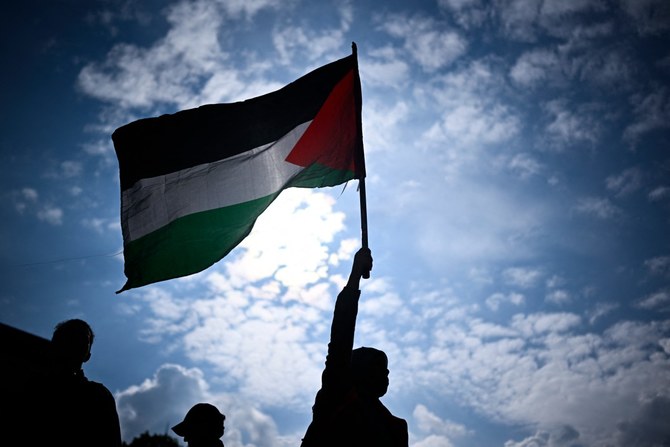
- Prime Minister Gabriel Attal said there would never be a right to disrupt France’s universities with such protests
- Police acted after about 100 students had been occupying a lecture theater for two hours
Paris: French police detained 86 people following an operation to remove students staging a pro-Palestinian occupation at the Sorbonne university in Paris, prosecutors said Wednesday.
Those arrested in the police operation on Tuesday night were being held for a variety of public order offenses, said the statement.
They include wilful damage, rebellion, violence against a person holding public authority, intrusion into an education establishment and holding a meeting designed to disrupt order. Some are also being held for participation in a group with a view to preparing violence or damage to property.
They can be held for an initial 24 hours, which can then be extended another 24 hours.
The day before police moved in, Prime Minister Gabriel Attal said there would never be a right to disrupt France’s universities with such protests.
Police acted after about 100 students had been occupying a lecture theater for two hours in “solidarity” with the people of Gaza, an AFP journalist on site noted.
Tuesday night’s police operation at the Sorbonne — and at another university on Paris’s Left Bank, Science Po university — followed interventions to end similar protests at the end of April.
Students at universities in several European countries have followed the actions on US campuses where demonstrators have occupied halls and facilities to demand an end to partnerships with Israeli institutions because of Israel’s punishing assault on Gaza.
Police have also intervened to clear campuses in the United States, Netherlands and Switzerland.
Palestinian militant group Hamas on October 7 attacked southern Israel, resulting in the deaths of about 1,170 people, mostly civilians, according to an AFP tally of Israeli official figures.
Israel estimates that 129 hostages seized on October 7, out of the 253 taken, are still being held in Gaza, including 34 the military says are dead.
Israel’s retaliatory offensive has killed at least 34,789 people in Gaza, mostly women and children, according to the health ministry in the Hamas-run besieged Palestinian territory.


